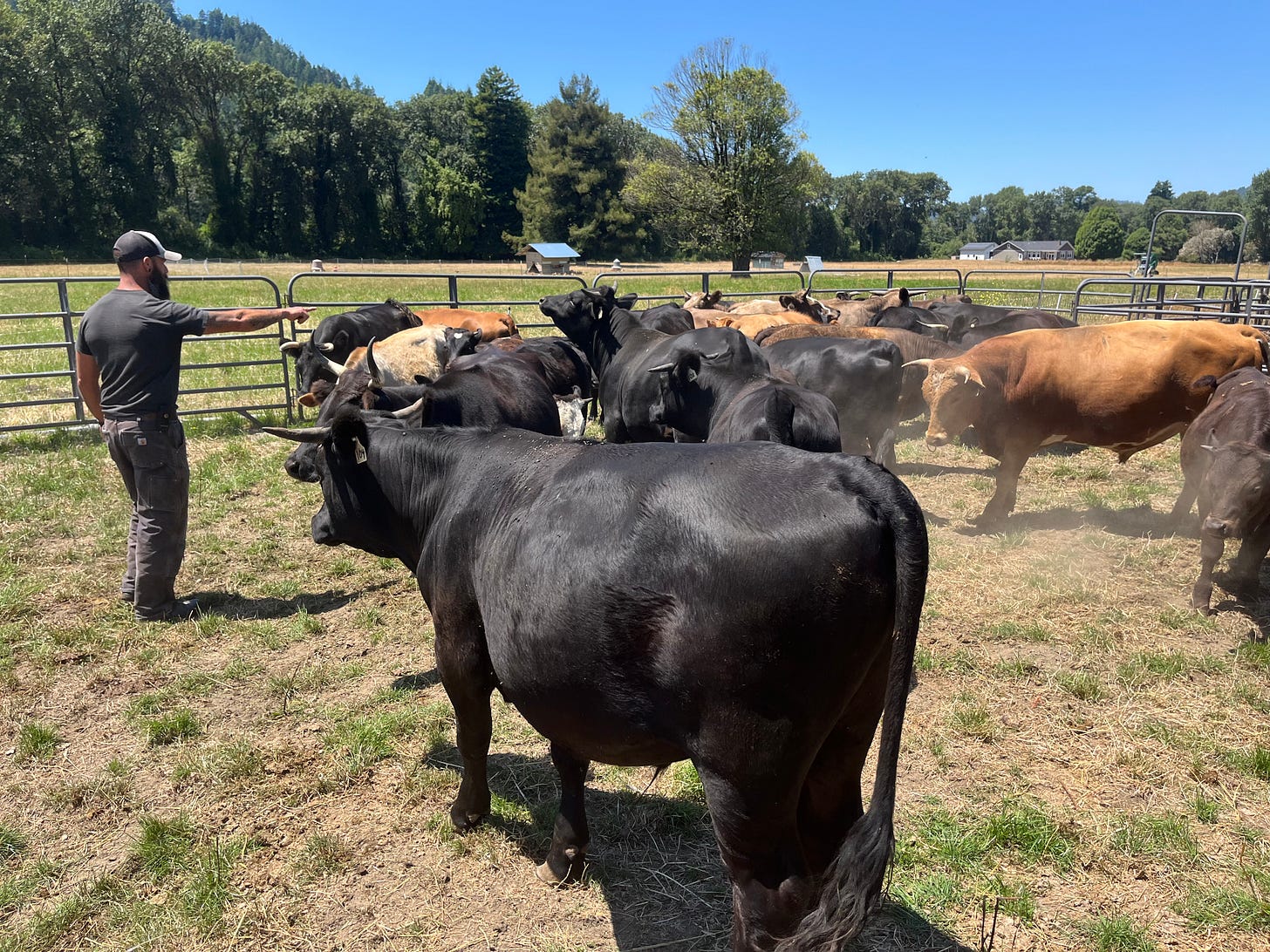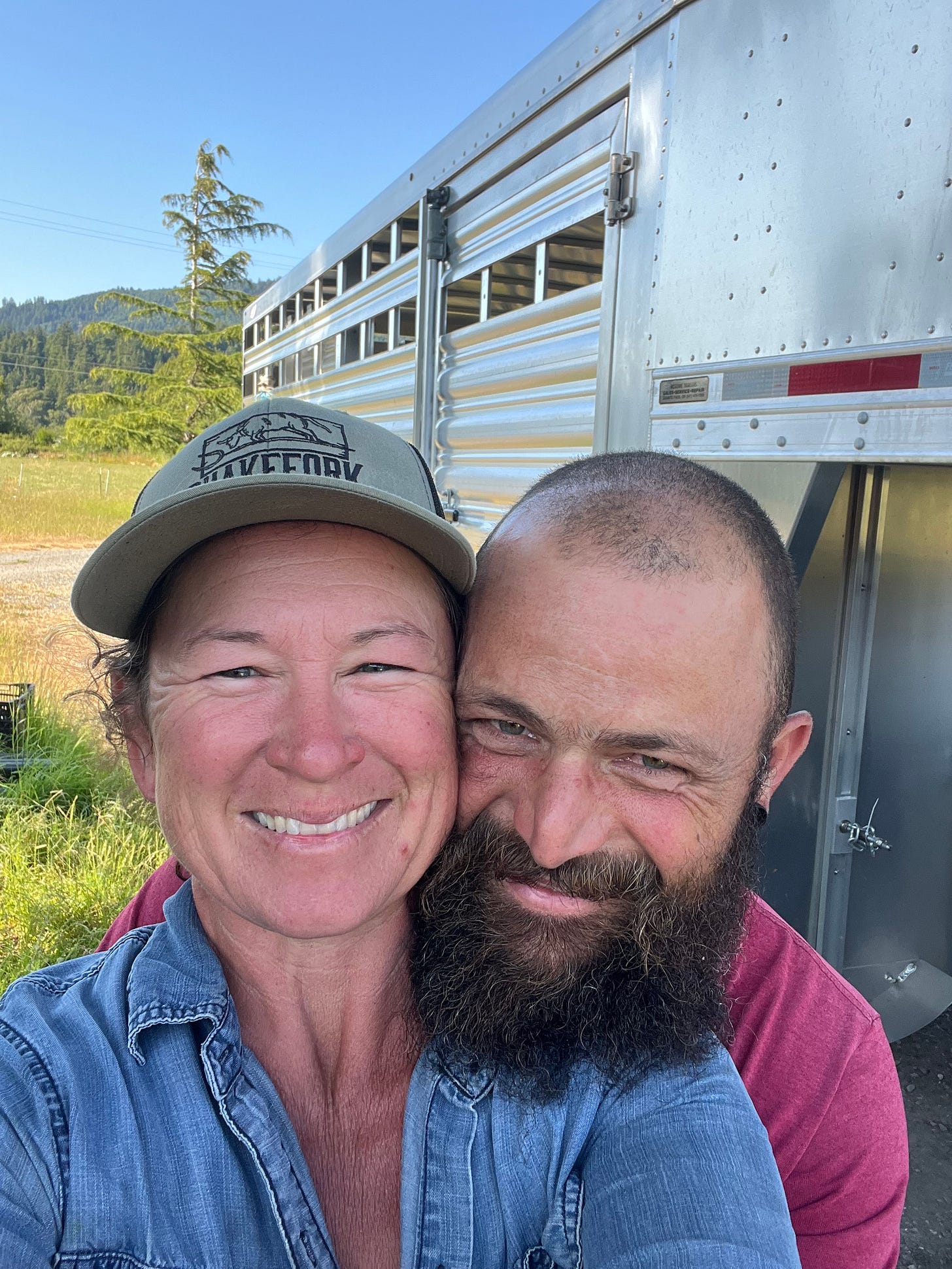It’s never a good thing to hear mooing in the middle of the night. Contented cattle are quite cattle. I always say that cattle only moo because of the 4 H’s; they are Hungry, Horny, Having a baby, or are in Harm's way. Most of the time they should be grazing contentedly or chewing a cud. So it was startling when I was woken up by mooing at 2 am. I quickly dressed and went out to see what the commotion was about. The five steers that were supposed to be in the corral were roaming around the barnyard like some lost and distraught teenagers. Oh Shit!
I woke Melanie and our on farm crew because this was going to need more than just me to fix. This group of steers had been sorted out the day before because they were going for processing early the next morning, just not this early. It took us two hours of herding and chasing steers to get four of the five back into the corral and loaded on the trailer. One of them was just too wild and he went back out with the herd. He is going to be particularly difficult to load next time around.
Since it was too late to go back to sleep I decided to start my 6 hour drive to the meat packing facility early. It didn’t have to be this way in many ways. First off the steers should have stayed in the corral, and second I shouldn’t have to drive six hours away to process our beef.
Humboldt County used to have its own USDA harvest facility, but it shut down last year. Honestly mainly because it was poorly managed. It is a hard business with tons of regulations, and our quaint slaughterhouse, that felt like stepping back in time to the 1970’s, was way out of its league in the current business world. Old school ledgers and file cabinets are not going to cut it, pun intended, in 2025. When Redwood Meats shut down it left many producers here having to haul our beef essentially two states away for processing. It is 241 miles door to door for me to drive and I have to cross the Coastal Range which means a small winding road no matter which route I choose. Six hours there and six hours back with a trailer. That’s a long day.
This is a story that unfortunately is more common across the country. Consolidation in the meatpacking industry is a real problem. Four companies now control 80% of the beef sold in the United States. Honestly this doesn’t make any sense. Meat is a perishable product. So like other perishable products it makes sense to raise and process it close to the place it is going to be consumed. This decentralized model is how it used to be. Heck back in the day Humboldt used to have multiple slaughterhouses for our small rural area. Now we don’t have one.
It’s a hard business to run because of the regulations and cost associated with them. I understand the intention behind the law but the outcome means that only a few extremely large players can compete. This in turn means that the meat is less safe because mistakes and loop holes are bigger. There have recently been recalls of meat that was contaminated with E. coli and there will continue to be problems with meat produced in large factories. When Whole Foods sources its meat from Australia and Uruguay there is now way to keep it fresh. Food safety concerns are real when you are dealing with a perishable product, but I don’t think that extending the supply chain and increasing the scale is the answer. Honestly the large corporate entities that run the big meat packers can never actually be held accountable in any real way. Legal protection is one the main reasons a business forms a corporation in the first place.
I am still lucky to be able to bring my beef to a well run small scale meat packer, but in order to do it I have to haul the animals way out of my area. I hope that we can get a slaughterhouse back here in Humboldt County. I honestly hope that every county can have its own facility. A small meat packing plant is B to B (business to business). They rely on other businesses as their customers. In order for them to make money they rely on those businesses to be successful. Which means the independent farmers and ranchers who are selling directly to consumers. This is where you come in. In order to support local food processing you have to buy local food. That is the only way to create enough demand to support a business of this type.
Support your local food producer. They have to do a lot in order to bring that steak to your grill. It’s not an easy business but it is also rewarding. I love what I do and I promise to keep producing the best possible food I can. Just be nice to me at the farmer’s market because I lost some sleep last night.






Yes! Know and support your local farmer! I live in western San Mateo county, and my food comes either from my yard, or a produce farmer 10 miles down the road. My meat comes from 10 miles down the road, as well. Markegard Grassfed, Left Coast Grassfed, Pomponio Ranch and Root Down Farm. I know Doniga Markegard hauls her cattle all the way up to Santa Rosa, and in the past she’s used the plant in Paso Robles. Either way, that’s a hell of a ride for those beasts. I don’t know where the others take their animals. I guess for you, now, it’s either Santa Rosa or Yreka? Sacramento? There was a White Paper from UC Davis addressing these problems and offering suggestions for solutions. It was written in 2021, and I’m not sure if it has been updated.
In any case, I enjoy your writing and photos, and I wish you all the best! I love how you use your oxen to work your land. Are you Biodynamic as well? I tried the BD approach just in my garden, and it’s not easy! I just stick to Permaculture practices, now.
Oh man! I feel your pain on this so deeply!!
I’ve worked for years on these regs. Yet, even as many politicians and NGOs give voice to supporting the small, American producers, it’s as you share here: slaughter houses are getting shuttered every day and farmers and consumers lose opportunity.
I could write so much more about this (and I have on my publication 😂).
But it’s as you say, the bottom line is to support your local providers.
There’s so much corruption even in many of the NGOs purportedly advocating for the small farmers.
Rather than fund them, we’ve got to rally around our local producers.
Thank you Cattle Culture!